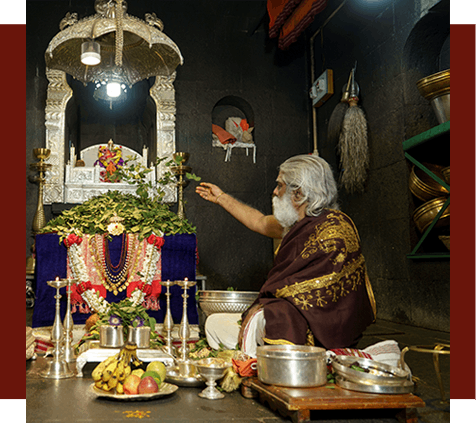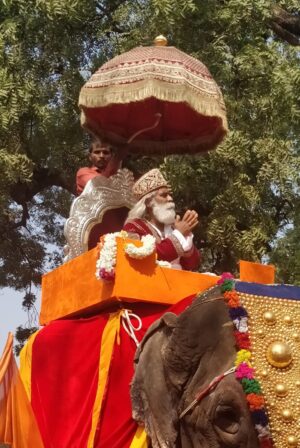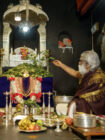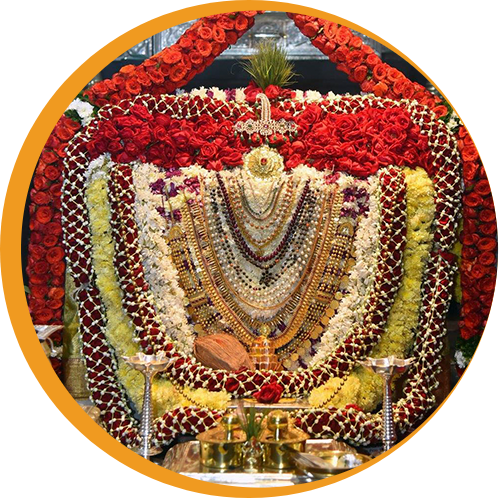
Parampara
Parampara
Shri Manohar Manik Prabhu Maharaj



Shri Manohar Manik Prabhu (1858-1877) the immediate successor to the holy Peetha of Shri Prabhu, was one among those great Yogis of India’s enviable age-long spiritual tradition, who, within a very short period of temporal life, reached the pinnacle of spiritual accomplishment, which many find difficult to achieve in their entire lifetimes, or even in repeated cycles of births and re-births. Born on 7th September 1858, he was the elder son of Shri Prabhu’s younger brother Shri Narsimha Tatya Maharaj. He adorned the holy seat of Shri Prabhu at a tender age of seven years and attained Sanjivani Maha Samadhi in the midst of his youth, at the age of nineteen.
When some of the close associates of Shri Prabhu saw that Shri Prabhu’s health was slowly deteriorating, they were concerned about the future of the Sampradaya and what arrangements would be made to continue the glorious Sampradaya. Many who considered the matter as a temporal and administrative arrangement were guided by their own preferences regarding who should ascend the Gadi. In spiritual matters, such decisions are not taken on a temporal consideration but on a spiritual consideration. It is the Divine Will and not the human preference that prevails in such matters. Therefore, Shri Prabhu had also not opened his mind on this matter even to his closest associates.
Even though their concern was genuine, they should have felt assured that Shri Prabhu, having established the Sampradaya, would also provide the agency for continuing it. People, however, had no patience or possibly they had their own self-interest. Therefore, even before Shri Prabhu could spell out his views, many enthusiastic persons, who had taken over themselves the responsibility of managing the Samsthan, had already commenced the search for a successor. They even found one intelligent young person in Bhalki town who appeared suitable to them. They suggested this person to Shri Prabhu and advised him to take this young man as his Shishya. Shri Prabhu kept quiet and did not express any opinion about the young person, who was also known to him and in fact was quite close to him.
A good person or a good manager need not necessarily be a good leader of the masses, especially in matters which are Spiritual in nature. It is the Divine will and not human consideration or convenience which decides these matters. Shri Prabhu, having in his mind already chosen his successor, did not announce this till just prior to taking Samadhi.
It appeared that Shri Prabhu had, through his divine vision, already selected an able and meritorious successor in Shri Manohar, his nephew. Shri Prabhu had seen in him the intense austerity of all his past lives and the required preparedness for taking the responsibility. How proper was the choice only time was to tell? Shri Manohar was not only intelligent as a child but had shown great spiritual capacity in his very childhood. He seemed not only to have had the desire for a non-dual relationship with the Brahman but already seemed to have established himself in that state of Bliss.
When Shri Manohar Manik Prabhu took over the charge of Shri Manik Prabhu Samsthan, he seemed to have been fully energized to cope with the responsibility assigned to him. With the devoted followers of the Sampradaya, he delved deep in both spiritual and temporal matters pertaining to the Samsthan. He organized the financial matters of the Samsthan in such a way that the spiritual activities of the Samsthan, as well as its administrative matters, could smoothly be continued. He was very particular and concerned that the rituals and festivities which were being conducted during Shri Prabhu’s time are continued uninterruptedly. Since he left the responsibility of managing the temporal matters of the Samsthan to his brother Shri Khanderao, he was free to look after the spiritual matters concerning the Sampradaya. When he ascended the Gadi, he was hardly seven years of age but it seemed that he had already traversed miles on the spiritual path. Great mystics are fully aware of their past lives and therefore, they restart from where they had left in their previous life. He mastered Sanskrit in addition to Marathi, Kannada and Hindi in no time.
His deep understanding of the Vedas and Upanishads was marvelled at by all those who came in contact with him. He was not only a seer but also an exceptional poet. During the entire period of twelve years when he was on the Gadi as Shri Manohar Manik Prabhu, he created a mass of literature codifying the Pooja, Abhishek, Upasana and other rituals which are still prevalent in Maniknagar. He composed innumerable Stotras, Shlokas, Ashtakas and Bhajans in Sanskrit as well as in regional languages, establishing, if at all it was necessary, that Shri Prabhu had chosen his successor well. He was indeed an Avatar, for rarely do we come across in the Indian spiritual horizon a child prodigy like him, comparable to Shri Sanatkumar brothers, Shri Shuka, Shri Shankaracharya or Shri Dnyaneshwar. He was a great Yogi and lived the life of a pure realised soul. His constant communion with the Supreme Self was making him yearn to merge his individual Self with the Universal Self. Even as he was designing the temple over the Samadhi of Shri Manik Prabhu Maharaj, he was also contemplating within himself for creating a niche where he would rest in due time to come. He would exclaim often, “How beautiful and quiet a place is this? A fit place for a Yogi to sit and meditate for all the aeons to come.” However, none could read his mind at that time and that was as it should be. While remaining himself a celibate, he saw that the family of Shri Prabhu would not end.
So he got his brother Shri Khanderao married to the daughter of Shri Bapacharya, who was one of the close associates of Shri Manik Prabhu Maharaj. Shri Khanderao was twelve years of age at that time. His entire time was devoted to the supervision of the affairs of the Samsthan, without any time for him to be educated in a formal manner. This came to the attention of Shri Manohar Manik Prabhu. He gave him initiation in spiritual matters and made him conversant with the Vedas, the Upanishads and other scriptures. In time to come, Shri Khanderao became so engrossed in these subjects that his knowledge of Mantra Shastra was considered very commendable. When Shri Manohar Manik Prabhu realised that Shri Khanderao had become well versed in all the scriptures, rites and rituals and was thus qualified to look after the spiritual needs of the Sampradaya, he decided to take Samadhi. The news came as a shock to the devotees. Surely this was not the age for the Maharaj to take Samadhi. Besides, there was much work ahead to consolidate the values prescribed by Shri Manik Prabhu. Even though the foundations were properly laid down by Shri Manohar Manik Prabhu, it was expected that he would also lead the Sampradaya for some more years to consolidate its values and principles. In the tradition laid down by Shri Manik Prabhu Maharaj, Shri Manohar Manik Prabhu also got himself initiated in Sanyas. On an auspicious day (28th October 1877), he took his seat in the underground cellar which he had got constructed for himself behind the Samadhi of Shri Manik Prabhu Maharaj. Then sitting in Yogic Padmasana, controlling his breath, he merged his breath with the Primal Breath. Thus, Shri Manohar Manik Prabhu merged in the Infinite Bliss, the Brahman.
Shri Manohar Manik Prabhu Maharaj
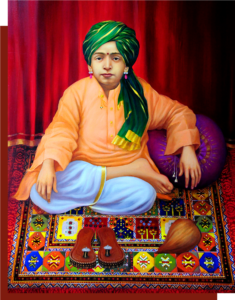
Shri Manohar Manik Prabhu (1858-1877) the immediate successor to the holy Peetha of Shri Prabhu, was one among those great Yogis of India’s enviable age-long spiritual tradition, who, within a very short period of temporal life, reached the pinnacle of spiritual accomplishment, which many find difficult to achieve in their entire lifetimes, or even in repeated cycles of births and re-births. Born on 7th September 1858, he was the elder son of Shri Prabhu’s younger brother Shri Narsimha Tatya Maharaj. He adorned the holy seat of Shri Prabhu at a tender age of seven years and attained Sanjivani Maha Samadhi in the midst of his youth, at the age of nineteen.
When some of the close associates of Shri Prabhu saw that Shri Prabhu’s health was slowly deteriorating, they were concerned about the future of the Sampradaya and what arrangements would be made to continue the glorious Sampradaya. Many who considered the matter as a temporal and administrative arrangement were guided by their own preferences regarding who should ascend the Gadi. In spiritual matters, such decisions are not taken on a temporal.
consideration but on a spiritual consideration. It is the Divine Will and not the human preference that prevails in such matters. Therefore, Shri Prabhu had also not opened his mind on this matter even to his closest associates. Even though their concern was genuine, they should have felt assured that Shri Prabhu, having established the Sampradaya, would also provide the agency for continuing it. People, however, had no patience or possibly they had their own self-interest.
Therefore, even before Shri Prabhu could spell out his views, many enthusiastic persons, who had taken over themselves the responsibility of managing the Samsthan, had already commenced the search for a successor. They even found one intelligent young person in Bhalki town who appeared suitable to them. They suggested this person to Shri Prabhu and advised him to take this young man as his Shishya. Shri Prabhu kept quiet and did not express any opinion about the young person, who was also known to him and in fact was quite close to him.
A good person or a good manager need not necessarily be a good leader of the masses, especially in matters which are Spiritual in nature. It is the Divine will and not human consideration or convenience which decides these matters. Shri Prabhu, having in his mind already chosen his successor, did not announce this till just prior to taking Samadhi.
It appeared that Shri Prabhu had, through his divine vision, already selected an able and meritorious successor in Shri Manohar, his nephew. Shri Prabhu had seen in him the intense austerity of all his past lives and the required preparedness for taking the responsibility. How proper was the choice only time was to tell? Shri Manohar was not only intelligent as a child but had shown great spiritual capacity in his very childhood. He seemed not only to have had the desire for a non-dual relationship with the Brahman but already seemed to have established himself in that state of Bliss.
When Shri Manohar Manik Prabhu took over the charge of Shri Manik Prabhu Samsthan, he seemed to have been fully energized to cope with the responsibility assigned to him. With the devoted followers of the Sampradaya, he delved deep in both spiritual and temporal matters pertaining to the Samsthan. He organized the financial matters of the Samsthan in such a way that the spiritual activities of the Samsthan, as well as its administrative matters, could smoothly be continued. He was very particular and concerned that the rituals and festivities which were being conducted during Shri Prabhu’s time are continued uninterruptedly. Since he left the responsibility of managing the temporal matters of the Samsthan to his brother Shri Khanderao, he was free to look after the spiritual matters concerning the Sampradaya. When he ascended the Gadi, he was hardly seven years of age but it seemed that he had already traversed miles on the spiritual path. Great mystics are fully aware of their past lives and therefore, they restart from where they had left in their previous life. He mastered Sanskrit in addition to Marathi, Kannada and Hindi in no time.
His deep understanding of the Vedas and Upanishads was marvelled at by all those who came in contact with him. He was not only a seer but also an exceptional poet. During the entire period of twelve years when he was on the Gadi as Shri Manohar Manik Prabhu, he created a mass of literature codifying the Pooja, Abhishek, Upasana and other rituals which are still prevalent in Maniknagar. He composed innumerable Stotras, Shlokas, Ashtakas and Bhajans in Sanskrit as well as in regional languages, establishing, if at all it was necessary, that Shri Prabhu had chosen his successor well. He was indeed an Avatar, for rarely do we come across in the Indian spiritual horizon a child prodigy like him, comparable to Shri Sanatkumar brothers, Shri Shuka, Shri Shankaracharya or Shri Dnyaneshwar. He was a great Yogi and lived the life of a pure realised soul. His constant communion with the Supreme Self was making him yearn to merge his individual Self with the Universal Self. Even as he was designing the temple over the Samadhi of Shri Manik Prabhu Maharaj, he was also contemplating within himself for creating a niche where he would rest in due time to come. He would exclaim often, “How beautiful and quiet a place is this? A fit place for a Yogi to sit and meditate for all the aeons to come.” However, none could read his mind at that time and that was as it should be. While remaining himself a celibate, he saw that the family of Shri Prabhu would not end.
So he got his brother Shri Khanderao married to the daughter of Shri Bapacharya, who was one of the close associates of Shri Manik Prabhu Maharaj. Shri Khanderao was twelve years of age at that time. His entire time was devoted to the supervision of the affairs of the Samsthan, without any time for him to be educated in a formal manner. This came to the attention of Shri Manohar Manik Prabhu. He gave him initiation in spiritual matters and made him conversant with the Vedas, the Upanishads and other scriptures. In time to come, Shri Khanderao became so engrossed in these subjects that his knowledge of Mantra Shastra was considered very commendable. When Shri Manohar Manik Prabhu realised that Shri Khanderao had become well versed in all the scriptures, rites and rituals and was thus qualified to look after the spiritual needs of the Sampradaya, he decided to take Samadhi. The news came as a shock to the devotees. Surely this was not the age for the Maharaj to take Samadhi. Besides, there was much work ahead to consolidate the values prescribed by Shri Manik Prabhu. Even though the foundations were properly laid down by Shri Manohar Manik Prabhu, it was expected that he would also lead the Sampradaya for some more years to consolidate its values and principles. In the tradition laid down by Shri Manik Prabhu Maharaj, Shri Manohar Manik Prabhu also got himself initiated in Sanyas. On an auspicious day (28th October 1877), he took his seat in the underground cellar which he had got constructed for himself behind the Samadhi of Shri Manik Prabhu Maharaj. Then sitting in Yogic Padmasana, controlling his breath, he merged his breath with the Primal Breath. Thus, Shri Manohar Manik Prabhu merged in the Infinite Bliss, the Brahman.

© 2024 Shri Manik Prabhu Samsthan. All Rights Reserved.
Design & Developed by Pixel N Paper
